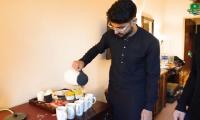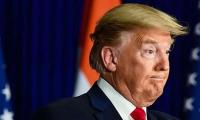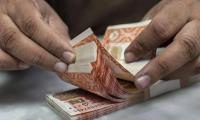Noted intellectual and former federal minister Javed Jabbar has said young people need to be fully acquainted with the complexities of Pakistan’s creation, and history be made a compulsory subject right up to the master’s level.
He was speaking at a discussion on his book, “Pakistan -- Unique Origins: Unique Destiny?”, organised by the Oxford University Press (OUP) at the OUP Bookshop at the Dolmen Mall on Thursday evening.
The discussion was in the form of a dialogue between the author and Nadya Chishti Mujahid, assistant professor at the Institute of Business Administration, University of Karachi. Jabbar described his early life and migration to Pakistan from Hyderabad Deccan, India.
Replying to the first question from Nadya Mujahid as to what his message to today’s young generation would be, he said, “My experience with our curricula has been disturbing. We just take the narrative of the Indians and the West, namely that Pakistan was abruptly created as a demand from the Muslims for a separate homeland. Actually, there were causative factors building up over the centuries, one of which was that a minority (the Muslims) had been ruling over the majority (Hindus) for hundreds of years. The Hindus felt that they too had a right to rule. The Muslims were displaced in 1857.”
These, he said, were some compelling causative factors. So, he said, it would be wrong to hold just Mr Jinnah responsible for Partition. He also cited the Transatlantic Charter signed between the UK and the US in 1941, at the height of World War II, Article 3 of which laid down that all the nations under the yoke of foreign rule would be given independence.
“Non-Muslims of Pakistan were the first Pakistanis. To be a nation, you have to have land. This is their land. The main problem of Pakistan is acknowledging the minorities.” As for secularism, Jabbar said that it had been wrongly translated as “La dinyat”: “The whole nation has been brainwashed,” he said. Actually, he said, secularism was something that acknowledged the rights of minorities. He said that it was the profound message of Mr Jinnah.
Digging into history, he said it was Gandhi who introduced religiosity into politics, something that was opposed by Mr Jinnah. The book’s title, which spoke of Pakistan’s “unique destiny”, he said, was based on the outcome of five factors: global changes; climate change; governance and democracy; relations with immediate neighbours; defining “Pakistaniyat”.
He said that young people must give up the notion that only being a Muslim comprised a Pakistani. Contrary to what was the general impression these days, he said, Pakistan was a really vibrant society, a pulsating country, with highly resourceful, talented people. What was needed, he said, was evidence-based balance into appraisal and analysis of the country.
The ex-federal minister cited the case of far-flung areas of Pakistan normally given up as underdeveloped, like Dera Ismail Khan, where he said he found the people imbued with such a lot of ingenuity and were really progressive. By and large, his balance sheet of Pakistan was highly optimistic. His talk was followed by an animated question-answer session.
One of the questioners asked his opinion on liberalism to which he replied that liberalism implied being receptive to fresh knowledge, fresh innovative ideas, new technology and new mores. Unfortunately, he said, the obscurantist elements in our society had construed liberalism as licentiousness, which, he said, was as far removed from the truth as one could imagine.
Earlier, Ameena Saiyid introduced both the speakers narrating their antecedents and achievements, her speech being punctuated with humour and a really lighthearted stance. So was Javed Jabbar’s characteristically self-deprecating humour.
The whole function, as such, was wrapped in a really lighthearted and relaxing ambience.
She said that the book was unusual in that it described the positive side of the Pakistan reality at a time when Pakistan-bashing seemed to have become a favourite pastime so much so that even Pakistanis seemed to be busy bashing their country themselves.
The image shows a tobacco company worker holding cigarettes. — AFP/FileHYDERABAD: An illegal cigarette factory...
This image shows the dead body. — AFP/FileAn incident unfolded in Quaidabad on Tuesday, resulting in one fatality...
Edhi Marine Services team is busy in a rescue operation in Karachi on March 17, 2024. — PPI An e-taxi driver...
Shah Abdul Latif University Khairpur building can be seen in this image. — Facebook/Shah Abdul Latif University,...
Representational image of a handcuffed man. — Pexels/FileHYDERABAD: A police operation was carried out in Hyderabad,...
A representational image showing a person handcuffed and standing behind bars. — AFP/FileThe SSGC has continued...







